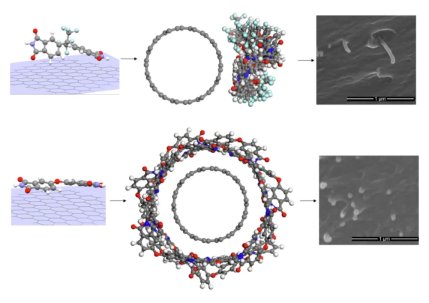Publications
Select the year of publication...
| 2016-2018 | 2019-2021 | 2022-2024 | 2025 |
| 2004-2006 | 2007-2009 | 2010-2012 | 2013-2015 |
| before 1990 | 1991-1995 | 1996-2000 | 2001-2003 |
...or go to the
Recent Publications
The size of critical secondary nuclei of polymer crystals does not depend on supersaturation
Yang Liu, Zhiqi Wang, Yao Zhang, Tianyu Wu, Tianze Zheng, Bao Hua Guo, Günter Reiter, Jun Xu. Nature Communications 16 (2025) 3773
It is still a great challenge to determine the size of critical nuclei, which is crucial for a comprehensive understanding of crystallization and for testing the controversial crystallization theories. Here, we propose a method to determine the size of critical secondary nuclei on growth faces of poly(butylene succinate) single crystals in solution, basing on the probability of statistically selecting crystallizable units in random copolymers. In a dilute solution and for a given crystallization temperature, we reveal that the size of critical secondary nuclei was independent of supersaturation, contrary to the well-accepted prediction of existing theories which expect that the size of the critical nucleus increases with decreasing supersaturation. Accounting correctly for the dilution-caused change in the steady-state concentration of clusters of various sizes, we remedy inconsistencies of existing theoretical approaches in deriving the correct size of critical secondary nuclei in solution being independent of supersaturation. (more...)
Binghua Wang, Hailong Zou, Xuchen Wang, Changyu Shen, Jingbo Chen, Günter Reiter, Bin Zhang. Nature Communications 16 (2025) 3275
The dissolution of polymer crystals often proceeds at rates varying in time and space. Here, using low molecular weight poly(ethylene oxide) as a model polymer, we exploit step-wise selective dissolution for unveiling how spatial variations in metastability are generated during the growth of lamellar polymer single crystals. The dissolution velocity along defined crystal faces is constant, but ca. 5 times faster for rough than for smooth faces. From the temperature dependence of dissolution, we derive detachment energies of 420 ± 40 kJ/mol and 650 ± 50 kJ/mol for rough and smooth faces, respectively, suggesting that on a rough face polymer chains have ca. 1/3 less neighboring molecules to interact with. The observed high values of the activation energy indicate that, for dissolving a polymer crystal, the progressive detachment of whole chains is indispensable. Our study reveals a strong relation between growth kinetics and the resulting metastability of polymer crystals. (more...)
Baode Zhang, Snežana D. Zarić, Sonja S. Zrilić, Iosif Gofman, Barbara Heck, Günter Reiter. Communications Chemistry 8 (2025) 21
 The interplay between attractive London dispersion forces and steric effects due to repulsive forces resulting from the Pauli principle often determines the geometry and stability of nanostructures. Aromatic polyimides (PI) and carbon nanotubes (CNT) were chosen as building blocks as two components in the hetero delocalized electron nanostructures. Two PIs, having the same diamine part and different linkage substituents between two phenyl rings of dianhydride part, one linked with ether bond (C-O-C) (OPI), the other with C-(CF3)2 (FPI), were investigated. Surprisingly, two CNT/PI nanocomposites show distinct failure mode from CNT yielding to CNT pull-out failure. Calculation of the interaction energy and chain conformations of each PI upon CNT was performed by accurate density functional theory (DFT) calculations and molecular dynamic simulation (MDS). (more...)
The interplay between attractive London dispersion forces and steric effects due to repulsive forces resulting from the Pauli principle often determines the geometry and stability of nanostructures. Aromatic polyimides (PI) and carbon nanotubes (CNT) were chosen as building blocks as two components in the hetero delocalized electron nanostructures. Two PIs, having the same diamine part and different linkage substituents between two phenyl rings of dianhydride part, one linked with ether bond (C-O-C) (OPI), the other with C-(CF3)2 (FPI), were investigated. Surprisingly, two CNT/PI nanocomposites show distinct failure mode from CNT yielding to CNT pull-out failure. Calculation of the interaction energy and chain conformations of each PI upon CNT was performed by accurate density functional theory (DFT) calculations and molecular dynamic simulation (MDS). (more...)
Valentina Pirela, Leire Unanue, Justine Elgoyhen, Javier Ramos, Juan Francisco Vega, Agurtzane Mugica, Manuela Zubitur, Cuong Minh Quoc Le, Abraham Chemtob, Radmila Tomovska, Günter Reiter, Jaime Martín, Alejandro J. Müller. European Polymer Journal (2025) 113721
This work studies how the chemical structure of relatively similar high-sulfur alternating polythioether homopolymers (DMDS-alt-DVE, DMDS-alt-TEGDVE, and DMDS-alt-BDDVE) affects their structural properties, morphology, polymorphism, and crystallization kinetics. Differential scanning calorimetry (DSC) and polarized light optical microscopy (PLOM) experiments revealed a complex crystallization for the samples in which up to three different polymorphic phases were identified: a very low melting crystal form (VL-Tm form), a low melting crystal form (L-Tm form) and a high melting crystal form (H-Tm form), characterized by their corresponding melting temperature ranges and confirmed via Wide-Angle X-ray Scattering (WAXS). A coexistence of negative and positive spherulites was found, and their origin was revealed by atomic force microscopy (AFM), which showed how the lamellar arrangement varied in the samples from predominantly radial to a cross-hatched morphology. (more...)
List of Publications
- Fluorescence of a dye-doped cholesteric liquid crystal film in the region of the stop band: theory and experiment
- J. Schmidtke and W. Stille. Eur. Phys. J. B 31, 179 (2003)
- Investigating polymer crystallization by time-dependent light scattering: a direct approach in the data analysis applied for s-polypropylene
- Anke Hoffmann, Gert Strobl. Polymer 44, 5803-5809 (2003)
- Defect Mode Emission of a Dye Doped Cholesteric Polymer Network
- J. Schmidtke, W. Stille, H. Finkelmann. Phys. Rev. Lett. 90, 083902 (2003)
- Condensed Matter Physics: Crystals, Liquids, Liquid Crystals, and Polymers
- Gert Strobl. Springer 2003, ISBN 978-3540003533
- Role of the entangled amorphous network in tensile deformation of semicrystalline polymers
- Y. F. Men, J. Rieger, G. Strobl. Physical Review Letters 91, 095502 (2003)
- Photonic defect modes in cholesteric liquid crystal films
- J. Schmidtke and W. Stille. Eur. Phys. J. E 12, 553 (2003)
- Characteristic variations in the effect of diluents on polymer crystallization and melting observed for a sample of poly (ethylene-co-octene)
- Barbara Heck, Gert Strobl, Michael Grasruck. Eur. Phys. J. E 11, 117-130 (2003)
- Editorial: Special issue on Properties of Thin Polymer Films
- Günter Reiter (Editor) and James Forrest (Guest Editor). Eur. Phys. J. E 8, 101 (2002)
- Morphological Phase Transitions in Spontaneous Dewetting of Thin Films on Homogeneous and Heterogeneous Surfaces
- A. Sharma, G. Reiter. Phase Transitions 75, 377-399 (2002)
- Pattern formation and ordering in thin films of crystallisable block copolymers
- Günter Reiter, Gilles Castelein, Jens-Uwe Sommer. Macromol. Symp. 183, 173–178 (2002)
- Some relevant parameters affecting the glass transition of supported ultra-thin polymer films
- Y. Grohens, L. Hamon, G. Reiter, A. Soldera, Y. Holl. Eur. Phys. J. E 8, 217-224 (2002)
- Are changes in morphology clear indicators for the glass transition in thin polymer films? Tentative ideas
- Günter Reiter. Eur. Phys. J. E 8, 251-255 (2002)
- The melting line, the crystallization line, and the equilibrium melting temperature of isotactic polystyrene
- M. Al-Hussein, G. Strobl. Macromolecules 35, 1672-1676 (2002)
- From crystalline block slips to dominance of network stretching - Mechanisms of tensile deformation in semi-crystalline polymers
- Yongfeng Men, Gert Strobl. Chinese Journal of Polymer Science 20, 161-170 (2002)
- Role and importance of radius of gyration of chains in the melt in the crystalization of poly(1-butene)
- Qiang Fu, Gert Strobl. Chinese Journal of Polymer Science 20, 143-154 (2002)
- Evidence for a mechanically active high temperature relaxation process in syndiotactic polypropylene
- Yongfeng Men, Gert Strobl. Polymer 43, 2761-2768 (2002)
- Strain-controlled tensile deformation behavior of isotactic poly(1-butene) and its ethylene copolymers
- M. Al-Hussein, G. Strobl. Macromolecules 35, 8515-8520 (2002)
- Change of modulus and yielding properties of syndiotactic polypropylene with the glass transition
- Y.F. Men, G. Strobl, P. Wette. E-Polymers, 040 (2002)
- Morphological basis for the complex melting behaviour of isotactic polystyrene
- M. Al-Hussein, G. Strobl. E-Polymers, 038 (2002)
- Physik kondensierter Materie. Kristalle, Flüssigkeiten, Flüssigkristalle und Polymere
- Gert Strobl. Springer 2002, ISBN 978-3540432173


